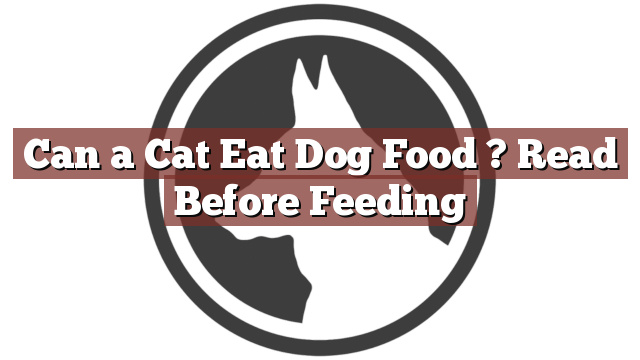Understanding Your Dog’s Dietary Needs
When it comes to our furry companions, understanding their dietary needs is of utmost importance. Dogs, just like humans, require a well-balanced diet to thrive and maintain optimal health. This means providing them with the right combination of essential nutrients, including proteins, fats, carbohydrates, vitamins, and minerals. Feeding your dog high-quality dog food specifically formulated for their nutritional requirements is key to ensuring their overall well-being.
Can a Cat Eat Dog Food? Read Before Feeding
Many pet owners may wonder, "Can a cat eat dog food?" It’s a valid question with an answer that may surprise you. While cats and dogs have different nutritional needs, occasional nibbles of dog food generally won’t harm your feline friend. However, it is crucial to note that dog food is not suitable as a long-term diet for cats. Cats are obligate carnivores, meaning they require certain nutrients found only in animal tissues. Dog food, on the other hand, is formulated for omnivorous dogs and may not meet the unique nutritional requirements of cats.
Pros and Cons of Feeding Dog Food to Cats
Pros of Feeding Dog Food to Cats
There can be certain advantages to feeding dog food to cats in certain situations. For instance, if you run out of cat food temporarily, a small amount of dog food can serve as a temporary solution. Additionally, in some cases where a cat has specific dietary requirements due to health issues, a veterinarian may recommend a specific dog food brand that meets those requirements. However, it’s crucial to consult your veterinarian before making any such dietary changes to ensure your cat’s health and well-being.
Cons of Feeding Dog Food to Cats
While feeding your cat dog food in small amounts might not be harmful, relying on it as a primary or long-term source of nutrition can have negative consequences. Dog food lacks certain key nutrients that are essential for a cat’s health, such as taurine, arachidonic acid, and vitamin A. Long-term consumption of dog food by cats can lead to nutritional deficiencies, which may cause serious health issues, including heart problems, vision impairment, and weakened immune system. Therefore, it is crucial to provide your feline companion with a diet specifically formulated for cats.
Conclusion: Considerations and Recommendations
In conclusion, although cats can eat dog food in small amounts without immediate harm, it is not recommended as a long-term diet. Cats have unique dietary needs that dog food cannot adequately fulfill. To ensure your cat’s optimal health and well-being, it is essential to provide them with a nutritionally balanced diet designed specifically for cats. If you have concerns about your cat’s diet or need guidance on choosing the right cat food, consult with your veterinarian. Remember, a well-fed and properly nourished cat is a happy and healthy companion.
Thank you for taking the time to read through our exploration of [page_title]. As every dog lover knows, our furry friends have unique dietary needs and responses, often varying from one canine to another. This is why it's paramount to approach any changes in their diet with caution and knowledge.
Before introducing any new treats or making alterations to your dog's diet based on our insights, it's crucial to consult with a veterinarian about [page_title]. Their expertise ensures that the choices you make are well-suited to your particular pet's health and well-being.
Even seemingly harmless foods can sometimes lead to allergic reactions or digestive issues, which is why monitoring your dog after introducing any new food item is essential.
The content provided here on [page_title] is crafted with care, thorough research, and a genuine love for dogs. Nevertheless, it serves as a general guideline and should not be considered a substitute for professional veterinary advice.
Always prioritize the expert insights of your veterinarian, and remember that the health and happiness of your furry companion come first.
May your journey with your pet continue to be filled with joy, love, and safe culinary adventures. Happy reading, and even happier snacking for your canine friend!

